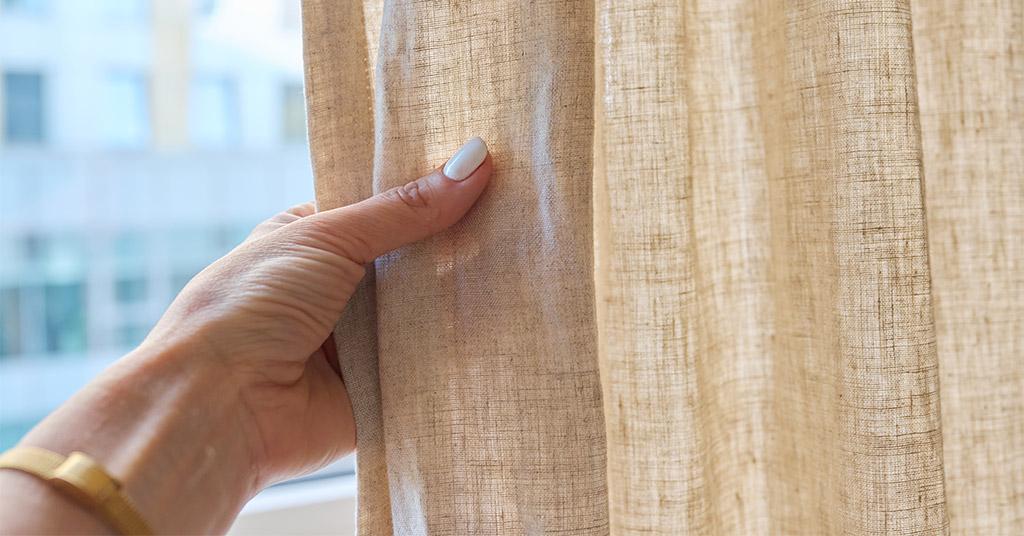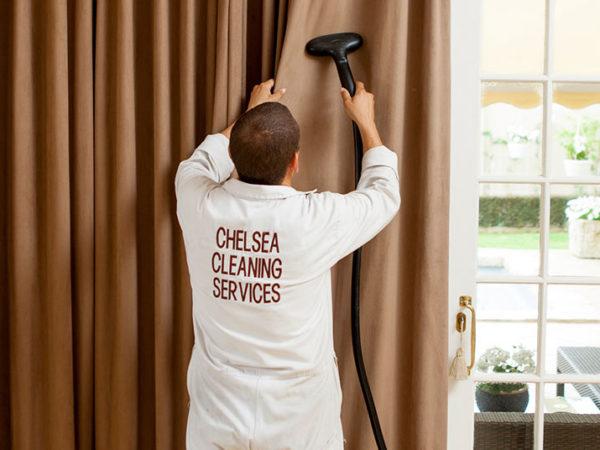
Mould can occur in any house, even when it’s clean and has never had a mould problem. However, a build-up of mould on curtains is a common problem during the wet Cape winter.
It’s impossible to prevent mould entirely, but following certain steps will significantly reduce and control its growth.
Why it’s worth taking steps to discourage mould on curtains
If it isn’t tackled immediately, mould can become a reoccurring problem that’s hard to eradicate. Mould is unsightly and causes an unpleasant smell.
Even after treatment, it can cause irreversible staining on curtain fabric. Over time, mould corrodes and weakens fabric if it’s left to progress too far. This causes holes and tears that can’t be repaired.
Mould also poses a health risk. Many people are allergic to mould spores. This exacerbates seasonal allergies. Excessive amounts of mould can cause respiratory issues.
Ways to discourage mould on curtains
Mould spores can end up in your home at any time. The wet Cape Town winters cause mould to grow rapidly when the air is damp and houses are closed up.
These tips will help prevent the accumulation of mould on your curtains.
Clean your curtains regularly
Frequently wash your curtains to stop mould from taking hold. Machine or hand wash your curtains every two to three months.
Let them air dry thoroughly. Ironing curtains helps kill any spores that might still be present.
Ensure good ventilation throughout the house
Good ventilation reduces humidity and prevents curtains from getting damp in winter. Don’t keep the house completely closed up, even during the cold, wet winter months.
Open the windows when the sun is out. Air conditioners and ventilation systems also help.
Buy a dehumidifier or moisture absorbers
Some rooms are naturally more humid than others, such as the bathroom and kitchen.
A dehumidifier helps remove excess moisture from the air. Moisture absorbers work well when they’re positioned in the problem area and replaced often.
Minimise excessive steam in the home
Keep pots and pans covered when cooking and use an extractor fan to prevent excess steam getting into the air. Bathroom doors should be kept closed while showering or bathing.
Tumble dryers emit damp air. They should vent outside or be in a separate laundry or garage.
Try to prevent condensation on windows
Condensation can cause curtains to be damp, which encourages mould growth. Condensation can’t be completely eliminated, but it can be reduced by insulating your house and investing in double glazing.
Treat damp-prone walls with a suitable paint
A damp or mould-prone wall will accelerate mould growth on nearby curtains.
Treat walls with a damp shield or anti-mould paint to keep them dry and mould free.
Clean the surrounding soft furnishings
Mould grows on fabric, so make sure soft furnishings near curtains are also cleaned, including upholstery, linen and mattresses. Be vigilant with items that absorb sweat. It encourages mould growth.
Install curtains away from the wall
Use larger curtain rod brackets to create a wider gap between the curtains and wall. This encourages air circulation, which helps prevent mould.
Curtains that are flush against a wall get damp more easily in the wet winter.
What to do if mould is visible on curtains
If you notice light mould on your curtains, take them out into the sun and remove the surface mould with a stiff brush. Wear gloves and a mask.
If mould is still visible, machine wash the curtains. Check the care instructions.
If the mould is stubborn, covers large areas or is very dark, it may not be possible to remove it entirely. Sometimes, the best option is to replace the curtains.
Professional curtain cleaning in the Cape
As winter approaches, consider getting your drapes professionally cleaned to discourage mould on curtains during the Cape winter. Ideally, curtains should be professionally cleaned at least once a year.
Professional cleaning can’t help if a bad mould infestation has occurred. That said, this type of cleaning involves high heat, which kills most mould spores before they become a problem. It also offers powerful stain removal.



